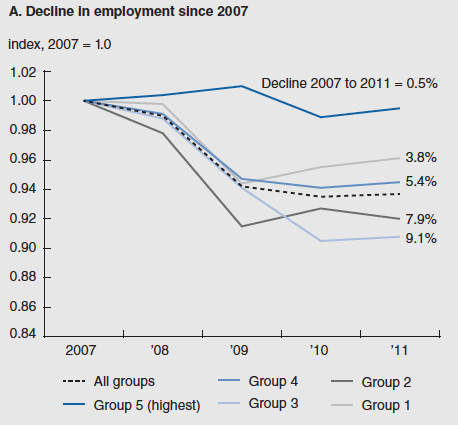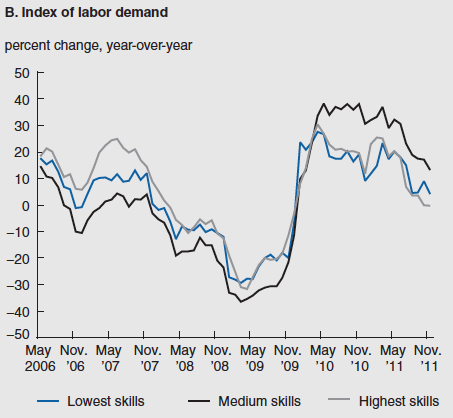The Chicago Fed just took a look into one of the most divisive—well, among wonks anyway—issues of the nation's continued high unemployment: the idea of a "skills mismatch," i.e. that there are lots of jobs for the unemployed, but the unemployed don't have the skills to do them. And they found something that surprised me.

That graph represents the decline in employment throughout the Great Recession, broken down by general skill levels, with Group 5 being the most skilled. Unsurprisingly, there's been a very small decline in unemployment among the highest skilled workers. After that, it gets more interesting. Employment for the lowest-skilled workers fell at a similar rate as employment for moderately high-skilled workers (Group 4) and medium-skilled workers (Group 3), but has recovered much faster than either. Yet the demand for medium-skilled workers is the highest of all groups:

It's curious that demand for medium-skilled workers is bucking the trend of recent years. Mike Konczal argues that the likely cause is flatlining "recruitment intensity," defined as "advertising expenditures, screening methods, hiring standards, and the attractiveness of compensation packages" and so forth: "The collapse of recruitment intensity helps us understand several things. First, the issue of how job openings are increasing while wages aren't."
Then again, I guess I shouldn't be surprised. "Jobless recoveries" and job polarization—roughly speaking, the splitting of the middle class—go hand in hand (PDF):
[A]lmost all of the contraction in aggregate employment during NBER dated recessions can be attributed to recessions in these middle-skill occupations. Third, jobless recoveries are observed only in these disappearing, middle-skill jobs. The high- and low-skill occupations to which employment is polarizing either do not experience contractions, or if they do, rebound soon after the turning point in aggregate output. Hence, jobless recoveries are due to the disappearance of middle-skill, routine occupations in recessions. Finally, it is important to note that jobless recoveries were not observed in middle-skill occupations prior to the era of job polarization and jobless recoveries.
That makes sense, but the Chicago Fed paper still complicates the data, suggesting that there is still a mismatch between unemployed middle-skill workers and employers, but not much of a skills mismatch. Expect that disconnect, however it manifests itself, to bear heavily on a 2012 campaign that will be laser-focused on the middle class, one form of recruiting intensity that's not in decline.


